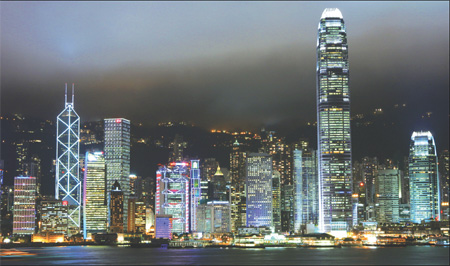A fight about our right to light
Updated: 2010-06-22 07:38
By HONG LIANG(HK Edition)
|
|||||||||
|
The night lights of Victoria Harbour: light pollution, or historical illumination? Edmond Tang / China Daily |
Asked about his impression of Hong Kong after his first visit here in the 1980s, the late Yu Pingbo, renowned scholar, famous for his interpretation of the classical epic, Dream of the Red Chamber, reportedly said: "It's so bright at night."
Indeed, the bright lights of Hong Kong that liven up our hills and dress up our harbor with their reflections dancing on the dark waters every night, have been a source of joy and pride among Hong Kong people for as long as anyone can remember. Nothing can better lift us from our weariness and gloom than a stroll along the waterfront in the evening to feast on the view of colorful lights on both sides of the harbor that never fail to give us hope for a better tomorrow.
When we're in the mood for celebration, we sometimes head straight for the Peak for a leisurely after-dinner stroll along the "Lovers' Lane" that ribbons around the hill, and to be dazzled by the lights of the city seen from above. These are the lights that reinforce our confidence in the future of Hong Kong as a prosperous community where people are uninhibited in showing off their good fortune.
Although we don't call our home the "City of Light," (Paris laid claim to this tribute long before anyone else), we grew up with lights around us. Nobody told us before that it was wasteful of energy to turn on these lights. Other than a few star-gazers, few had ever complained of light pollution, until now.
A group of environmentalists calling themselves Friends of the Earth have set about telling us that too much light is bad for us. This environmental group last week released its proposal pressing the government to take mandatory action against "light pollution," which it defined as any artificial lighting that causes health problems, energy wastage and disruption to ecosystems and astronomy.
This is a broad definition that, if followed, can lead to the mandatory switching off of most, if not all, the neon signs and decorative lighting of buildings and monuments. In absolute terms, they can all be considered wasteful of energy and having an undesirable effect on astronomy by distracting from star watching.
Of course, we are against any form of pollution, including light. Nobody wants to have a high-powered spotlight at a neighborhood building trained on his bedroom windows, as in a case cited by Friends of the Earth. But that's obviously an extreme case that should have little relevance to the issue.
Those giant neon signs on buildings on the waterfront should offend no one. They are quite delightful to watch - especially from the cross-harbor ferries. I can imagine that the electricity bill for keeping those signs lit all night must be high. But those advertisers don't seem to consider it a waste. Neither do we.
So far, the Hong Kong government hasn't made clear its stand on the issue. It may follow the conventional route of a public consultation before making a decision.
The public does have a say on the issue because city lights are a part of Hong Kong's collective memory. Don't switch it off in haste.
(HK Edition 06/22/2010 page2)
